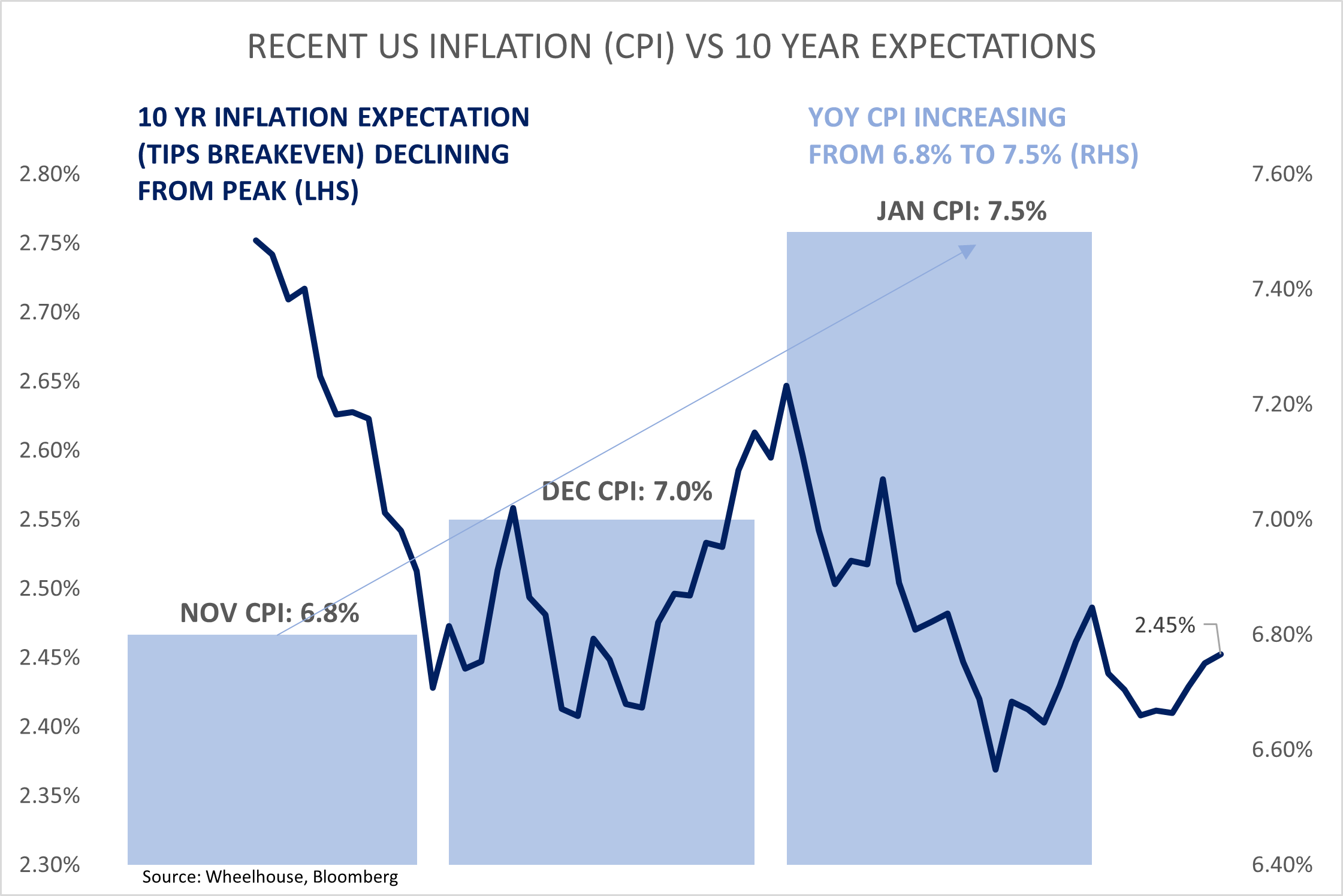Why inflation will cool
Right now it feels like inflation is everywhere. At the petrol pump, in the supermarket, at the butcher especially. Indeed, inflation prints particularly in the US are running hot with January CPI coming in at 7.5% last night, the highest in 40 years. As a result, brokers have been rushing to forecast 4 or even 5 hikes to interest rates during 2022 in the US, as they try to predict what it will take for the Federal Reserve to get back in front of the curve when it comes to dealing with inflation.
However, longer-term market expectations for inflation appear to be cooling. TIPs Breakevens, which measure the spread between nominal and inflation protected bonds (and hence, provide an excellent market-based estimate of future inflation), have fallen from their peak the past few months. This is despite the continued spike in short-term inflation.

Even with the surprise 7.5% CPI print last night, longer term inflation expectations barely moved. 10-year TIPS Breakevens were up less than 1 basis point.
We believe the primary reason for this divergence is the market looking forward and recognising that supply chain issues are likely to ease in future months. Until now, supply chain issues have proven to be the key exogenous shock driving higher inflation, whether this be Covid-driven labour shortages at the wharves, abattoirs or driving trucks, or 5x higher container shipping costs. It seems natural that as these roadblocks are removed, inflation will likely fall.
Shipping costs look to have peaked
In fact in recent months, shipping costs have already started to fall. Particularly for bulk commodities (refer Baltic Dry Index down 70% from peak), but also for containers, costs look to be falling across all routes. While container shipping prices remain very elevated relative to history inferring more short-term pain, pricing looks to have peaked in October around the same time inflation expectations rolled over.
Recently ship backlogs at the Port of Los Angeles have fallen to 18 days, the lowest since mid November. Additionally, west coast port terminal operators report Covid cases have fallen from 150 cases a day in January, to 25-35 cases a day, thus freeing up additional port workers.
In addition to port bottlenecks potentially easing, massive new shipping capacity is expected to arrive later this year and into 2023.
- In 2021, the number of container vessels ordered surpassed 2017, 2018, 2019 and 2020 combined as reported by VesselsValue, and was driven by “unprecedented box demand”.
- Clarkson Research estimate there are currently orders for 5.7m TEU, which represents a quarter of the total global containership capacity.
The CEO of Maersk, which controls nearly 20% of global container capacity, spoke this week and commented: "We expect quite a strong first half of 2022, and then we expect what we call a normalisation early in the second half"
While supply chain issues are not expected to clear immediately, the tide looks to be turning.
Furthermore, on the demand side of the equation, with continued re-opening we believe the demand pressure points will also cool, as global economies reposition for increased spending on services such as travel, restaurants and entertainment. Since the onset of the pandemic the nature of spending on durable goods (stay at home) has been particularly elevated, which should reverse as economies reopen. This in turn should partially reduce the acute demand for shipping containers and durable goods coming out of Asia and thus help ease prices.
Wage pressures remain a risk to the scenario of moderating inflation, although while wage demands have picked up recently they remain well below the increase in reported inflation. While the data is worth monitoring, the low participation rate in the US suggests to us that there is some latent capacity in labour markets should higher wages materialise, thus attracting workers back into the market.
Sentiment already shifting
Many investors are already voting with their feet in terms of changing their inflation expectations. In recent weeks the iShare TIPS Bond ETF has seen record outflows as investors re-evaluate the need for specialised inflation protection within their portfolios.
Implications for markets
One major concern of markets, particularly during January, is that the Federal Reserve has been boxed into a position of having to aggressively raise rates to counter the surge in inflation, regardless of the health of the underlying economy. This is exactly what happened in 2008 when the ECB was forced to hike to address rising inflation only to have to aggressively slash rates three months later as the GFC unfolded. Should supply chain issues subside in coming months and inflation expectations wane, the risk of policy error in our view diminishes.
Assuming the Fed manages to thread the needle and avoid policy error, this may potentially provide support to equity markets in the short-term as quite often markets do well in the initial stages of the hiking cycle. Particularly in the current environment as real interest rates remain negative (very accommodative), and the economy continues to remain strong and continues to re-open.
Further out however, the facts remain that we are entering a tightening cycle which should subdue equity market gains (from a valuation perspective), plus at some point cool the economy (and slow earnings growth). Neither of these are positive for equity markets, and as inflation subsides and real interest rates continue to rally, we could get to this point relatively swiftly.
As we transition to this genuine tightening cycle we expect a roller coaster ride for equity markets, which despite the higher volatility should still be able to deliver acceptable, although more muted, returns than previous years. Particularly relative to other asset classes which may be more challenged in a rising rate environment, defensive equities look a good place to be.
2 topics

